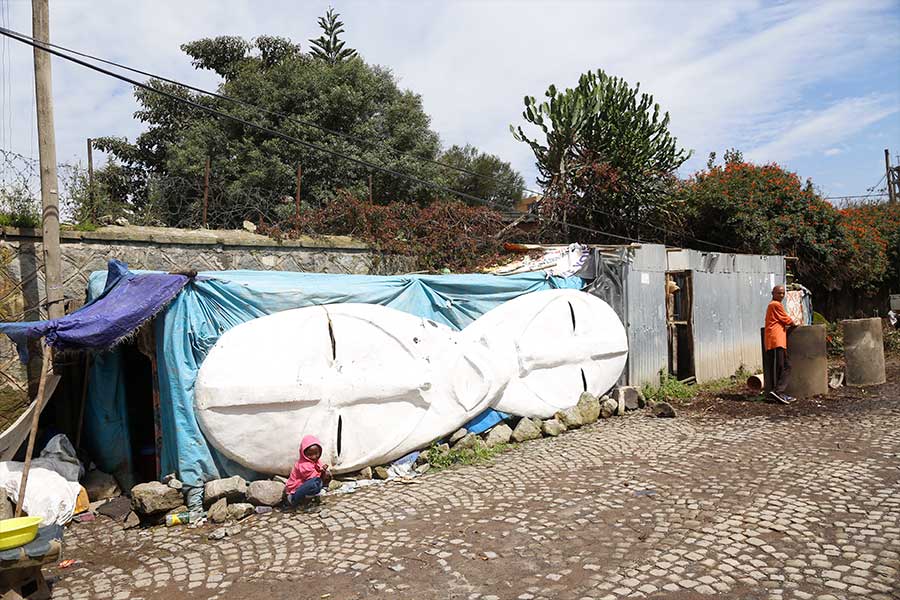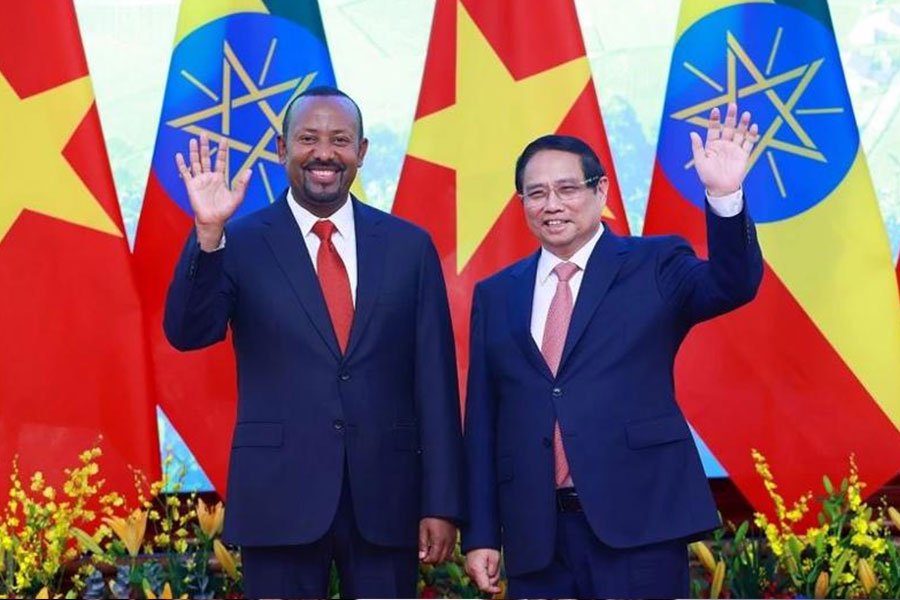
My Opinion | Sep 16,2023
Jun 28 , 2025
By Daniel Litvin
Resource competition has long underpinned international relations. But it seems to be retaking centre stage, much like the 19th-century Scramble for Africa or Western grabs for Middle Eastern oil in the last century.
As demand rises for the critical minerals that power the industries of the future, many countries are rushing to gain an edge. The United States (US) recently struck a high-profile minerals deal with Ukraine, which, for its part, wants to prevent a further haemorrhaging of US support for its war with Russia. US President Donald Trump has also talked of acquiring Greenland partly because of its potential mineral wealth, while his administration is negotiating deals with other mineral-rich countries, such as the Democratic Republic of the Congo (DRC).
Natural resources are increasingly being wielded as a foreign-policy weapon. In 2022, after Europe sanctioned Russia for its invasion of Ukraine, the Kremlin scaled back gas exports to the continent. And in the past few months, China has restricted exports of rare-earth elements as part of its trade war with the US, while India has suspended the Indus Water Treaty, a water-sharing agreement with Pakistan, following an attack on Hindu tourists in Kashmir. And the conflict between Israel and Iran has raised concerns among Israel's Western allies that Iran could disrupt shipments of oil and gas from the Persian Gulf.
Controls of oil and gas flows have long shaped geopolitics, but critical minerals have lately taken on new importance because escalating geopolitical tensions are accelerating efforts to bolster defence capabilities and shifting the AI race into high gear, all while the global clean-energy transition continues apace. Constructing new missiles, data centres, and electricity grids requires enormous amounts of metals and minerals, such as copper, cobalt, lithium, and nickel. In an increasingly divided world where China dominates the refining and processing of many of these critical minerals, many countries understandably fear losing access to them.
Looking ahead, climate change seems certain to intensify disputes over resources, particularly water and food supplies. For example, if shifting weather patterns further reduce arable land in vulnerable regions, affected countries may act assertively to protect grain-export routes or to maintain access to international riparian systems. But it makes little sense for countries to adopt a muscular, take-no-prisoners approach to resource diplomacy. History has shown that success requires thoughtful, patient, and tempered tactics.
To begin with, resource diplomacy requires careful, long-term planning. China's critical-mineral domination was not achieved overnight; it is the result of strategic foresight. Decades ago, the Chinese government adopted a forward-looking industrial policy and began investing in mining projects abroad and forging alliances with resource-rich countries. By contrast, many Western governments, having only recently woken up to the dangers of dependency on other countries for critical minerals, have made little headway in securing their own supply chains for these raw materials, despite introducing multiple initiatives to achieve this goal.
European governments were similarly shortsighted when they allowed themselves to become dependent on Russian gas in the years prior to the Ukraine war. As the continent learned in 2022, scrambling to diversify suppliers during or after a crisis can be highly costly and disruptive.
Countries should focus less on concluding impressive-sounding deals, and more on getting the boring details right. Understanding the technical and economic aspects of resource extraction and processing will determine whether these agreements achieve their long-term aims.
For example, mining executives have criticised the US-Ukraine resources deal for exaggerating the value of the country's critical minerals and the potential for attracting private investment to exploit them. Likewise, US officials may be overestimating the commercial viability of the minerals under Greenland's ice. In both cases, while Trump's manoeuvres have certainly garnered attention, they may do little to strengthen US mineral security.
Of course, countries should not exert too much control over others' resources, at least not without ensuring significant local benefits. Otherwise, they risk generating resentment and fueling a backlash.
In the 1960s and 1970s, Western oil firms were booted out of much of the Middle East because host governments felt they were getting too little in return. Today, Western mining firms are being squeezed in some parts of Africa and Latin America, owing to similar local perceptions. While Chinese mining firms have gained ground in Africa by portraying themselves as more supportive of local development, they, too, are sometimes tarred with the same brush of neo-colonialism. Securing resources without sowing suspicion is easier said than done.
Finally, resource-rich countries should recognise that weaponising their exports may backfire: importers may shift away from the relevant commodity or retaliate in other ways. A striking historical example is the 1973 Arab oil embargo. While this delivered the intended short-term result – inflicting economic pain on Western countries – it also impelled those countries to develop new oil fields outside the Arab world, such as in Alaska and the North Sea.
In the same vein, Russia's decision to cut gas flows to Europe caused initial pain, but ended up devastating a once-lucrative export market, which has now secured alternative energy supplies. And more countries are at risk of making the same mistake. India's suspension of the Indus Water Treaty has raised fears that China, Pakistan's ally, may weaponise the waterways under its control that flow to India. Likewise, in tightening global exports of its rare earths, China risks accelerating moves to open up rare-earth mining and processing facilities elsewhere in the world.
When it comes to securing access to natural resources or using them as geopolitical tools, headline-grabbing moves rarely produce the desired outcome, especially over the long term. Instead, effective resource diplomacy requires sensitivity, expertise, foresight, and balance – qualities that, unfortunately, are not prevalent among today's political leaders.
PUBLISHED ON
Jun 28,2025 [ VOL
26 , NO
1313]


My Opinion | Sep 16,2023

Life Matters | Apr 30,2021

Radar | Aug 22,2020

Radar | Apr 08,2024

Fortune News | Nov 09,2019

Radar | Apr 19,2025

View From Arada | Dec 11,2020

View From Arada | Apr 26,2025

Viewpoints | Jun 13,2020

Commentaries | Jan 21,2023

Photo Gallery | 176373 Views | May 06,2019

Photo Gallery | 166587 Views | Apr 26,2019

Photo Gallery | 157085 Views | Oct 06,2021

My Opinion | 136905 Views | Aug 14,2021

Dec 22 , 2024 . By TIZITA SHEWAFERAW
Charged with transforming colossal state-owned enterprises into modern and competitiv...

Aug 18 , 2024 . By AKSAH ITALO
Although predictable Yonas Zerihun's job in the ride-hailing service is not immune to...

Jul 28 , 2024 . By TIZITA SHEWAFERAW
Unhabitual, perhaps too many, Samuel Gebreyohannes, 38, used to occasionally enjoy a couple of beers at breakfast. However, he recently swit...

Jul 13 , 2024 . By AKSAH ITALO
Investors who rely on tractors, trucks, and field vehicles for commuting, transporting commodities, and f...

Oct 18 , 2025
The political establishment, notably the ruling party and its top brass, has become p...

Oct 11 , 2025
Ladislas Farago, a roving Associated Press (AP) correspondent, arrived in Ethiopia in...

Oct 4 , 2025
Eyob Tekalegn (PhD) had been in the Governor's chair for only weeks when, on Septembe...

Sep 27 , 2025
Four years into an experiment with “shock therapy” in education, the national moo...

Oct 18 , 2025 . By NAHOM AYELE
In a sweeping reform that upends nearly a decade of uniform health insurance contribu...

A bill that could transform the nutritional state sits in a limbo, even as the countr...

Oct 18 , 2025 . By SURAFEL MULUGETA
A long-planned directive to curb carbon emissions from fossil-fuel-powered vehicles h...

Oct 18 , 2025 . By BEZAWIT HULUAGER
Transaction advisors working with companies that hold over a quarter of a billion Bir...